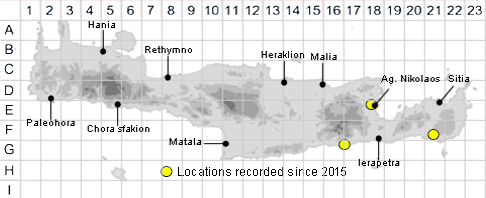
SPECIES DESCRIPTION
EUPHORBIA HYPERICIFOLIA
Family and Genus:- See- EUPHORBIACEAE
Common Names:- Pimpinela Blanca
Homotypic Synonyms:- Chamaesyce hypericifolia.
Meaning:- Euphorbia (L) For Euphorbus, physician to the King of Mauritania.
Hypericifolia (L) With leaves like Hypericum.
General description:- Herbs, annual, Root fibrous, 2-3.5 mm thick.
Stems:-
1) 15-30 cm tall. Branched mainly from upper parts, erect, 1-3 mm thick, glabrous
or pilose.
Leaves:-
1) Opposite; blade narrowly oblong or obovate, 1-2.5 cm x 4-8 mm, adaxial dark
green, abaxial light green sometimes purple-red, sparsely pilose on both
surfaces, or glabrescent abaxially, base rounded, margin, entire or serrulate
towards the apex, apex, obtuse or rounded.
2) Petiole, 1-2 mm.
3) Stipules, triangular, 1.3-1.5 mm, free or connate.
4) Involucral leaves, 2, similar to normal leaves.
Flowers:-
1) Cyathia, many in axillary or terminal cymes.
2) Peduncle, 3-5 mm.
3) Involucre, turbinate ca. 1 x 1 mm, marginal lobes 5, ovate-triangular.
4) Glands, 4, appendages white or light pink.
5) Male flowers numerous, slightly exserted from involucre.
6) Female, pedicel longer than the involucre.
7) Ovary, 3-angular, glabrous.
8) Styles, free.
9) Stigma, slightly 2-lobed.
Fruit:-
1) Capsule, 3-angular, 1-1.5 x ca. 2 mm, smooth, glabrous.
2) Seeds, ovoid-angulate, ca. 1.2 x 0.8 mm, striate, caruncle, absent.
Habitat:- Observations from Crete imply that this species of Euphorbia favours
cultivated ground especially in plant-pots and areas that have transplanted house
plants.
Distribution:- Records from the Mediterranean are very sporadic and no reliable
distribution data is available. Sporadic distribution on Crete. Introduced.
Comment;-
Reported from Crete, (ruderal habitat in Ag. Nikolaos) by Gregor & Meierott (2013:
277). In Euro+Med PlantBase (Euro+Med 2006+) it has been listed also for the
East Aegean Islands, but no further data are available. It may be on the verge of
becoming established in Greece. 1)
1) "Atlas of the Aegean Flora" Book1, Arne Strid 2016.
Flowering time:- Aug-Dec.
Photos by:- Steve Lenton
